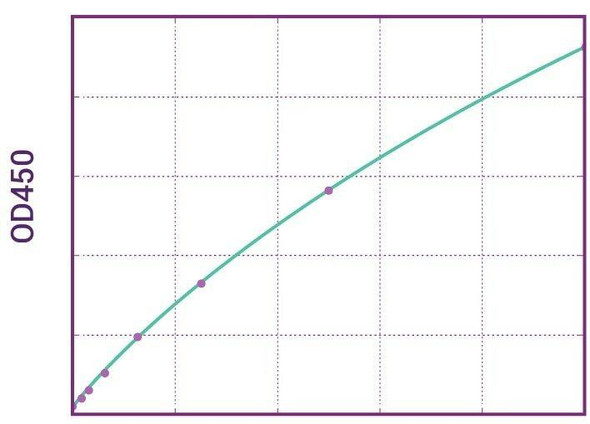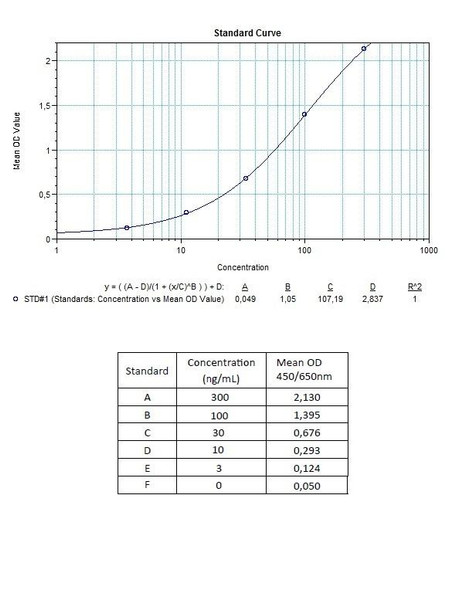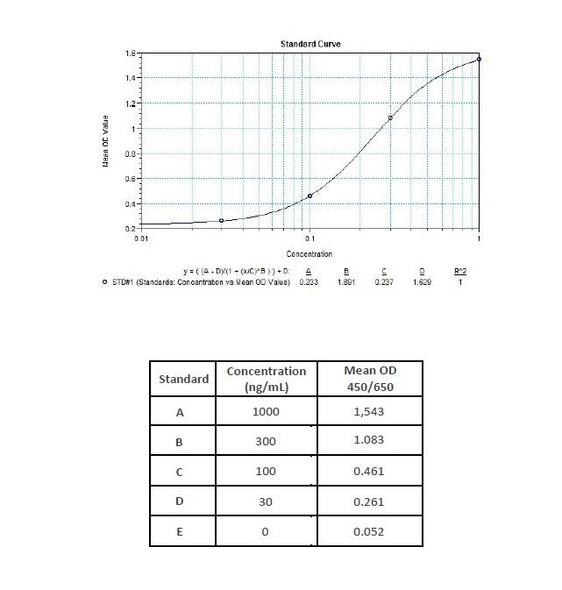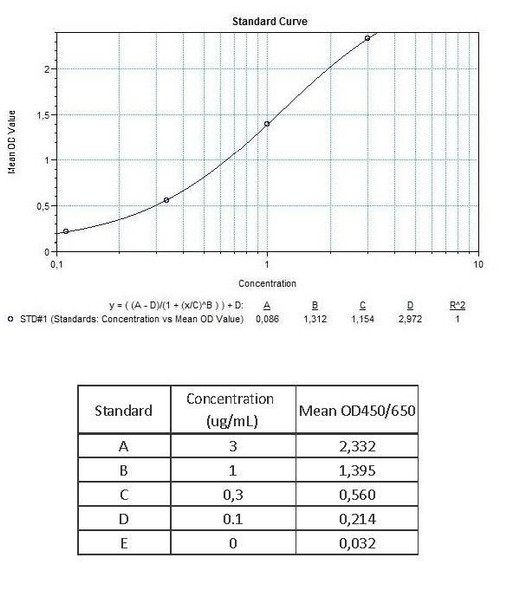Therapeutic Drug Monitoring
Ramucirumab (Cyramza®) ELISA Kit
- SKU:
- HUMB00022
- Product Type:
- ELISA Kit
- ELISA Type:
- Biosimilar ELISA
- Biosimilar ELISA Type:
- Free drug
- Applications:
- ELISA
- Reactivity:
- Human
- Analytes:
- Ramucirumab (Cyramza®)
- Research Area:
- Anti-Cancer
Description
Ramucirumab (Cyramza®) ELISA Kit
Enzyme-linked immunosorbent assay for the quantitative determination of free Ramucirumab (Cyramza®) in serum and plasma. The Assay Genie Ramucirumab ELISA has been especially developed for the quantitative analysis of free Ramucirumab in serum and plasma and is for research use only.
Ramucirumab (Cyramza®) ELISA Kit test principle
Solid phase enzyme-linked immunosorbent assay (ELISA) based on the sandwich principle. Standards and samples (serum or plasma) are incubated in the microtitre plate coated with the reactant for ramucirumab (Cyramza®). After incubation, the wells are washed. A horse radish peroxidase (HRP) conjugated probe is added and binds to ramucirumab captured by the reactant on the surface of the wells. Following incubation wells are washed and the bound enzymatic activity is detected by addition of chromogen-substrate. The colour developed is proportional to the amount of ramucirumab in the sample or standard. Results of samples can be determined directly using the standard curve.
Ramucirumab (Cyramza®) ELISA Product Information
| Information | Description |
Application | Free drug |
Required Volume (uL) | 10 |
Total Time (min) | 70 |
Sample Type | Serum, Plasma |
Number of Assays | 96 |
Detection Limit (ng/mL) | 20 (ng/mL) |
Spike Recovery (%) | 85-115% |
Shelf Life (year) | 1 |
Alternative Names | Anti-VEGFR2 mAb Cyramza |
Ramucirumab (Cyramza®) - Key Information
Ramucirumab (Cyramza®) mode of action
Ramucirumab is a human monoclonal antibody (IgG1) against vascular endothelial growth factor receptor 2 (VEGFR2), a type II trans-membrane tyrosine kinase receptor expressed on endothelial cells. By binding to VEGFR2, ramucirumab prevents binding of its ligands (VEGF-A, VEGF-C, and VEGF-D), thereby preventing VEGF-stimulated receptor phosphorylation and downstream ligand-induced proliferation, permeability, and migration of human endothelial cells. VEGFR stimulation also mediates downstream signalling required for angiogenesis and is postulated to be heavily involved in cancer progression, making it a highly likely drug target. In contrast to other agents directed against VEGFR-2, ramucirumab binds a specific epitope on the extracellular domain of VEGFR-2, thereby blocking all VEGF ligands from binding to it.
Ramucirumab (Cyramza®) uses
Ramucirumab (Cyramza®) is used to treat stomach (gastric) cancer, colorectal cancer, Hepatocellular carcinoma or non-small cell lung cancer that has metastasized to other parts of the body. Ramucirumab (Cyramza®) may be given alone or in combination with other cancer medicines.
Ramucirumab (Cyramza®) treatment
Ramucirumab is indicated for use in advanced gastric or gastro-esophageal junction adenocarcinoma as a single agent or in combination with paclitaxel after prior fluoropyrimidine- or platinum-containing chemotherapy. According to the information given by the manufacturer; Cmax: 171 µg/ml, Cmin: 49.5 µg/ml. Ramucirumab packaging includes warnings for arterial thromboembolic events, hypertension, infusion-related reactions, gastrointestinal perforation, clinical deterioration in patients with cirrhosis, and reversible posterior leukoencephalopathy syndrome.
The most common reactions observed in single-agent-treated patients at a rate of >10% and >2% higher than placebo were hypertension and diarrhea. The most common adverse reactions observed in patients treated with ramucirumab plus paclitaxel at a rate of >30% and >2% higher than placebo plus paclitaxel were fatigue, neutropenia, diarrhea, and epistaxis.
Ramucirumab (Cyramza®) ELISA Kit Contents
| Size | Kit Contents |
1 x 12 x 8 | Microtiter Plate Break apart strips. Microtiter plate with 12 rows each of 8 wells coated with reactant |
7 x 0.5 mL | Standards A-E |
2 x 0.5 mL | Controls Low and high levels |
2 x 50 mL | Assay buffer |
1 x 12 mL | Horse radish peroxidase conjugated probe |
1 x 12 mL | TMB substrate solution |
1 x 12 mL | TMB Stop Solution |
1 x 50 mL | Wash Buffer concentrate (20x) |
2 x 1 | Adhesive Foil |
Ramucirumab (Cyramza®) ELISA Protocols
| Steps | Protocol |
1 | Pipette 50µl of Assay Buffer non-exceptionally into each of the wells to be used. |
2 | Pipette 50 µL of each “Standards”, “Low level control”, “High level control” and |
3 | Cover the plate with adhesive foil. Incubate 30 min at room temperature (18- 25°C). |
4 | Remove adhesive foil. Discard incubation solution. Wash plate 3 times each with 300µL of diluted. Wash Buffer. Remove excess solution by tapping the inverted plate on a paper towel. |
5 | Pipette 100 µL of ready-to use Conjugate into each well. |
6 | Cover the plate with adhesive foil. Incubate 30 min at room temperature (18- 25°C). |
7 | Remove adhesive foil. Discard incubation solution. Wash plate 3 times each with 300 µL of diluted Wash Buffer. Remove excess solution by tapping the inverted plate on a paper towel. |
8 | Pipette 100 µL of TMB Substrate Solution into each well. |
9 | Incubate 10 min (without adhesive foil) at room temperature (18-25°C) in the dark |
10 | Stop the substrate reaction by adding 100 µL of Stop Solution into each well. Briefly mix contents by gently shaking the plate. Colour changes from blue to yellow. |
11 | Measure optical density with a photometer at 450/650 nm within 30 min after pipetting of the Stop Solution. |
Trademarks
CYRAMZA® is a trademark owned by or licensed to Eli Lilly and Company , its subsidiaries, or affiliates.






